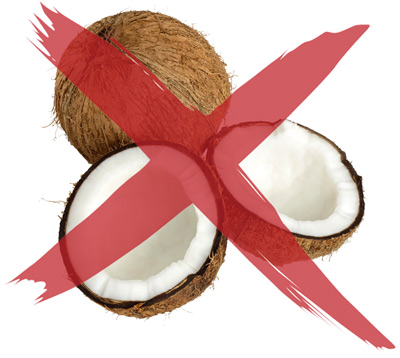Back when I was a nipper, 25 years before iTunes reared its head, my parents had a record player that played a bunch of ancient 78rpm records which had been kept in the family.
One of those geriatric discs was Coconut Woman by Harry Belafonte, originally released in 1957.
I remember spinning that warped and scratchy old disc and hearing about the wonders of coconut water; how it makes you strong like a lion and how you should make sure your daughter drinks it as it’s good for her.
Fast forward to the present, with all the hype bursting about the wonders of coconut water and the health benefits that it brings.
That song of old Harry’s has started playing in my head again and I’ve decided to decode the humble coconut, bringing my organic chemistry background into play to see whether coconut water stands up to scientific scrutiny. Or could it all be myth and magic?
What Is Coconut Water?
It’s one of the fastest growing food categories in the UK, sales are up nearly 200% in the USA. Madonna has thrown $1.5m into the Vita Coco brand, Demi Moore and Matthew McConaughey have done the same, Coca Cola and PepsiCo have got in on the action and Rhianna has been conveniently photographed clutching the fabled elixir on more than one occasion.
From a pure marketing perspective, the proposition has been identified and the brand values have been aligned with the target audiences. Peddled as ‘Mother Nature’s Sports Drink’, the push is on.
Coconut water is different to coconut milk. Coconut water is the clear liquid found inside young, green coconuts. As the coconut matures, the water is reconstituted into white coconut meat. Coconut milk is then manufactured by grating and emulsifying the white coconut meat.
Coconut water has a nutty, slightly sweet taste and quenches the thirst. Straight out of the coconut it tastes great.
Reports say that it’s the all-natural way to hydrate and add potassium and other electrolytes to your diet.
A big slice of the general population just doesn’t get enough potassium in their diets. They don’t eat enough fruits, vegetables or dairy, so coconut water can help fill in the nutritional gaps and top up electrolyte levels.
However, if you do eat healthily, you’ll be getting far more nutrition and electrolytes from your diet than coconut water can provide. More on this later.
Electrolytes, Why Do We Need Them?
The human body is just one big organic battery. Seriously. Our blood and cells are filled with sodium, potassium and other elements and compounds that make up the group of substances known as electrolytes.
They are critical in allowing cells to generate energy, maintain the stability of their walls, and to function in general. They generate electricity, contract muscles, move water and fluids within the body, and participate in many more critical functions within the body.
Our muscles and neurons are seen as electric tissues of the body. They are activated by electrolyte activity between the fluid inside our cells and the fluid that sits between cells.
In addition, our heart, muscle and nerve cells use electrolytes to maintain voltages across their cell membranes and to carry electrical impulses across themselves to other cells.
If electrolyte levels are out of whack this can lead to either weak muscles, or muscles that contract too severely. Either way, your body ceases to perform efficiently.
When you get stuck into an intense workout session, your body sheds electrolytes through natural sweating, so you need to replenish your electrolyte levels or you’re going to compromise performance.
The key thing here is that you need to be doing a prolonged and intense workout session. If it’s just moderate exercise then you’re probably not going to need to replenish those electrolytes as you won’t have attacked your reserves enough.
The Truth About Coconut Water
There is a lot of hype around coconut water. It will hydrate you after exercise, much the same as water will.
It does also contain electrolytes and sugar, so can replenish reserves after an intense exercise session somewhat, but the amounts of electrolytes that it contains are fairly small.
It’s probably about the same as having a sports drink. Most recreational athletes don’t train to exhaustion, so do not require electrolytic replenishment and plain water will provide the hydration that they need.
As for the long list of ailments and diseases that are purported to be cured by coconut milk, well that’s just hogwash.
Here’s a rundown of the constituent parts of coconut water (based on 100ml of water):
| TOTAL SUGARS | PROTEIN | FAT | POTASSIUM | SODIUM | CALCIUM | MAGNESIUM | PHOSPHORUS |
|---|---|---|---|---|---|---|---|
| 3.6g | 0.51g | 0.66g | 247mg | 45mg | 43.2mg | 11.7mg | 12.6mg |
So What Does All That Mean?
All the above components are for 100ml of coconut water, so it’s not scientifically accurate to take the above levels as the intake threshold. The average serving is 300ml, so you’ll be getting:
| NUTRIENT | AMOUNT PER SERVING | RDA | % of RDA |
|---|---|---|---|
| Potassium | 741mg | 4700mg | 15 |
| Sodium | 135mg | 1500mg | 9 |
| Calcium | 129.6mg | 1000mg | 13 |
| Magnesium | 35.1mg | 400mg | 8.8 |
| Phosphorus | 37.8mg | 700mg | 5.4 |
RDA – the recommended daily allowance – is the minimum daily dietary intake level of a nutrient, considered to meet the requirements of 97.5% of healthy individuals in each life-stage and sex group.
They are the absolute base level of what is required to keep the average person healthy and functioning correctly.
It is far better to exceed these levels in your diet, particularly if you are physically active, though do not go beyond the tolerable upper intake levels, set at 3, 4, 5 or even 10 times the RDA, depending on the mineral.
So as you can see from the table above, coconut water doesn’t make much of a dint in the RDA, which is the absolute minimum that you should be having anyway.
To Coconut Or Not To Coconut?
Although coconut water has been marketed as a super healthy and nutrient-rich post-exercise thirst quencher, its restorative properties have been splendidly over-hyped.
If you compare it with a range of other fruits or vegetables, it is seriously lacking in nutrients.
Coconut water is more a lifestyle choice than a necessity to aid in exercise recovery.
If you enjoy the taste and you’re happy to spend the money, coconut water is a harmless and relatively low-calorie way to add sodium and potassium to your diet and keep you hydrated.
It is fine for recreational athletes, but then so is water or a sports drinks. As previously mentioned, most adults don’t exercise strenuously enough to need sports drinks or coconut water. Good old-fashioned water will work just fine.
If you’re training with an intensity that warrants electrolyte replenishment and you prefer to employ methods that are more tailored to your athletic needs, then maybe just do the same as me.
Most of the time I just don’t workout to complete and absolute cardio exhaustion, I’m lifting weights more often at the moment, working through the Body Beast training programme, so the exhaustion is mostly muscular and I’m not dripping copious amounts of sweat.
During and after these workouts I’ll just drink water.
However, when I’m on the Insanity workout trail, particularly month 2, I need something extra.
I ignore the coconut water hype, sidestep the over-marketed sports drinks and get myself a big old glass of water. I throw in 50g of maltodextrin powder, dissolve an electrolyte tablet in there and chug it back. Job done.
It’s way more effective, cheaper and completely fad-free!
Did You Find This Post Useful?
If you enjoyed this post, found it helpful and think others would benefit from reading it too, it would make me extra happy if you shared it using the share icons below – thank you, it’s very much appreciated!
Also, if you have any questions or comments that you would like to ask or share, please comment below – thank you.



I love coconut water and have it pretty much daily. I’m fortunate to live in the Philippines, a tropical country where I have easy and affordable access to fresh coconuts, so I just drink it straight out of the coconut 🙂 and then I eat the meat after! A fresh coconut here costs 25 pesos (a little less than half a US dollar), but it is even cheaper in rural areas. We always have a supply of young coconuts here at home. I’m also a big fan of virgin coconut oil, especially for topical applications.
I do believe that packaged coconut water is totally different, because of the added sugars and preservatives. I’ve tasted a few bottled and canned coconut water products and they don’t come anything close to the real thing which is just pure coconut water straight out of the fruit. Depending on the season, fresh coconut water varies in sweetness, but it usually only has a tinge of sweetness. Even though I have a sweet tooth, I actually prefer it when it’s less sweet– I don’t know how to describe the taste exactly, but it’s just so refreshing. And it’s amazing to think that I am drinking water that nature has purified and enriched for me– through the mechanism of the coconut tree’s roots and trunk.
It’s great that Mercola and others are bringing so much attention to the benefits of coconuts, but I would only really recommend coconut water to people who live in a tropical country where you can get it fresh easily. You can still enjoy the benefits of coconuts with virgin coconut oil if you like, but maybe it’s better if you find a good natural oil that’s available in your area.